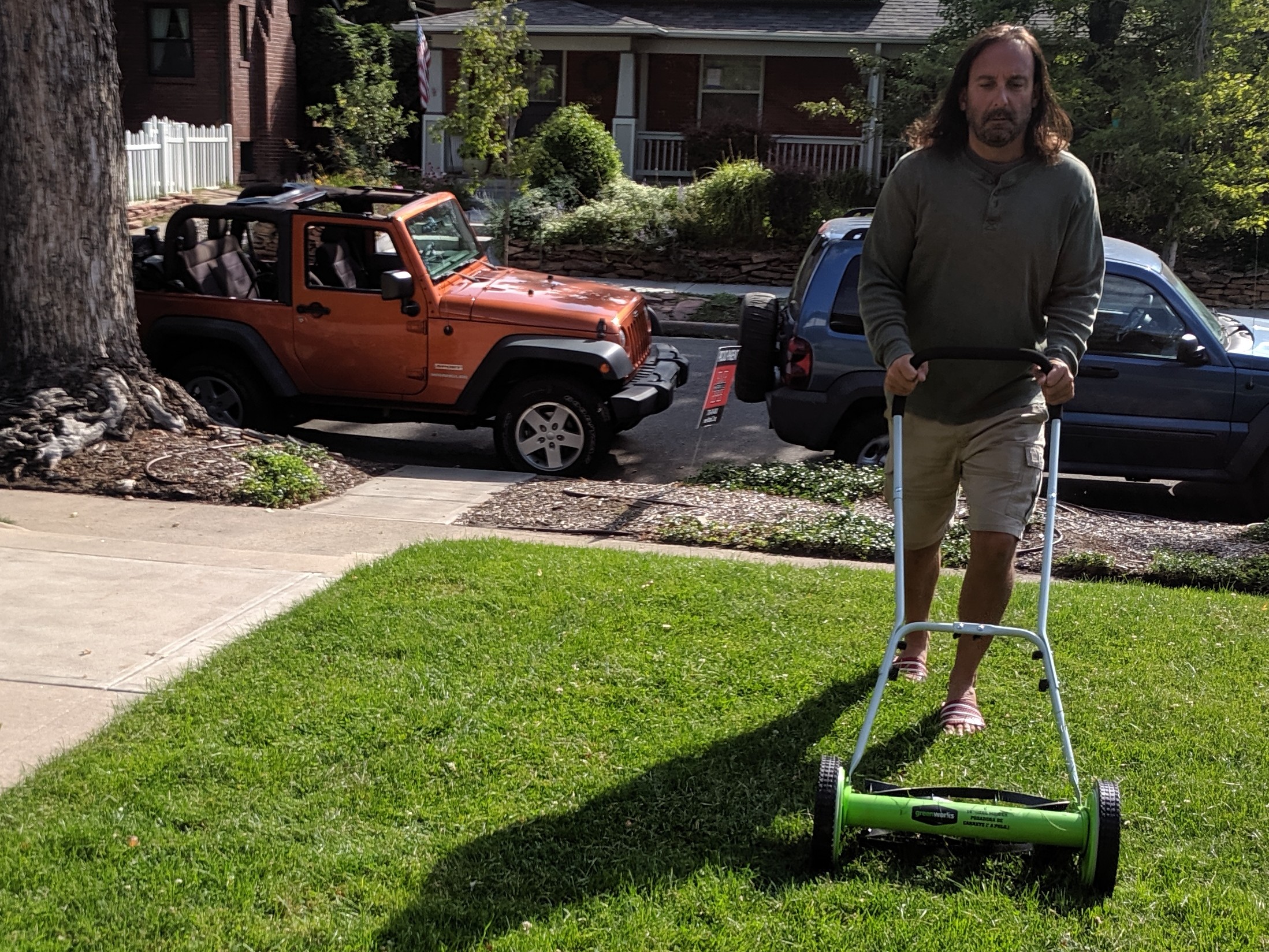View this post on Instagram
The look I am going for is a combination of Italian racecar driver and grunge band front man.
When I search the internet for styling tips, I inevitably come across pictures of Brad Pitt when he wore his hair long, and I love that look. The problem is, I’m a 46-year-old man with dark circles under my eyes carrying about 20 extra pounds. I have thinning hair (not receding, thinning—can you tell I’m sensitive about that one?), and it turns out I don’t have Brad Pitt’s face.
But still, I cling to the persona I desire because that’s the me that I want to project to the world.
I drive a Jeep Wrangler and keep the top down, even in the winter. I taught all four of my kids to ride bikes, ski, and now I’m teaching them to drive. It’s less for my satisfaction and more because I’m proud of my role in their lives. I never drink soda, I never buy clothes, and I cut my grass with a reel mower even though a gas or electric mower would do a better job.
These are the traits that make up who I am—the man I want the world to see. My pride and self-esteem are derived in part from this persona, so these traits and characteristics are foundational and important to me.
Sobering Identity
One more thing: I’m also a sober alcoholic, and that accomplishment tops the list of things I want the world to know about me.
My battle with addiction was the single most grueling and arduous challenge I will likely ever face, and I am proud of my permanent sobriety. It’s amazing how far I’ve come and how I’ve shifted my persona, but it’s disappointing that my pride in recovery seems to enrage so many people.
As a drinker, I drank IPAs before IPAs were cool. I loved the bitter taste and felt the manliness of the elevated alcohol percentage. The truth is, I would drink anything from an emasculating wine cooler to a disgusting shot of Galliano or Campari. But if I had my choice, I would proudly hoist a pint glass of India pale ale.
That was the cavalier persona I projected as a drinker. I thought it paired well with my thinning long hair and explained the extra baggage in my midsection.
My love of IPAs—not only for the flavor and the extra kick of alcohol content, but also for what they said about the kind of man I was—cannot be overstated. I was proud of the kegerator I had in the basement. I was proud to support local Colorado breweries. I was proud, even pompous, about my knowledge of brewing styles and techniques. I was an IPA snob, and I wanted everyone to know it.
Our personas—our identities—are so important. Without identities, we wouldn’t have eating disorders, thong underwear, German automakers, skinny jeans, a billion-dollar cosmetic industry, leather pants, liposuction, tie dyed T-shirts, or botox. Without our attachment to our identities, we wouldn’t have many alcoholics, either.
When it was time for me to stop drinking, nothing presented as significant a challenge as giving up my identity as the connoisseur of strong, local brews. The physical addiction was, frankly, easy to beat. Convincing my subconscious mind to rewire and adopt a new routine disassociating alcohol with pleasure was quite a bit more difficult.
But nothing compared to fighting the stigma associated with alcoholism that thrives in our society and was ingrained in my own thinking. Admitting my lack of control over my own consumption was embarrassing, but the idea of abstaining while the world sloshed around me in a rising tide of cocktails and lagers was more than my brain had the capacity to endure.
Alcoholism is a unique sort of addiction because of the haughty perch on which we place booze in our culture. No one battles drug addiction because of how woven into the best shining faces of society meth or heroin are. We don’t wear porn or food addictions out in public with pride. Alcohol is accepted, even revered. Being associated with having a playful glass wine in our hand or an expensive single-malt scotch ever present is a sign of status and refinement.
We use alcohol to celebrate and mourn, party and relax, socialize and enjoy solitude. It is the elixir of vibrancy, and removing it from our lives is like cutting out our soul.
All the Days at One Time
I’m not much of a fan of taking sobriety, “one day at a time.” When we program ourselves to go to war each day against temptations to drink, we eventually get battle fatigue. I am so thankful for the millions of lives Alcoholics Anonymous has saved over the last century, but I think the requirement for constant vigilance is a major reason the AA success rate is estimated to be in the teens or single-digit percentage.
I’m not strong enough to fight the same villain over and over for the rest of my life. I have found peace in recovery by researching and learning the details about alcohol. It is a poison—period. Sure, there are millions of people who consume it daily with minor and camouflaged negative consequences, but that doesn’t change the fact that inhibiting proper brain function is the mechanism that results in the buzz drinkers seek. Just because drinkers who avoid addiction can drink alcohol in a controlled way doesn’t change the fact that they are drinking a poison. I’m sure there’s an amount of Drano or antifreeze I could drink, too. No thanks.
I take pride in having changed my perspective on alcohol. Instead of being jealous of people who can control their drinking, I take pity on them because they aren’t living their best possible life. I don’t wish I could drink moderately. Instead, I thank God for opening my eyes and my mind to the truth our society never wants any of us to know. I’m proud to be amongst the enlightened few.
AA teaches that pride and arrogance lead to drinking. I believe my pride is necessary for my permanent sobriety.

Insulting my Supporters
I am blessed to feel the love of a lot of people for whom alcohol is a regular part of their lives. While they offer support and tell me they are proud of my decision to choose sobriety, I am often cautioned about my belief that there is no value to drinking alcohol in any quantity. I have been told I come across as arrogant, and I’m taking on a fight I can’t possibly win. I’ve been warned about insulting the intelligence of people who otherwise love and support me.
I get it. People who have their drinking under control don’t want to be pitied by an alcoholic like me. That is counterintuitive and puts the shoe on the other foot. No responsible adult who believes everything has a place in moderation wants to accept the facts about occasionally using ethanol to inhibit brain function any more than people want to feel guilty about eating at McDonald’s sometimes or slowly working through a bag of Doritos. Moderation doesn’t change the basic facts. Diluting pollution might make it manageable, but it doesn’t make it desirable.
Moderate drinkers are, by definition, limited in their support of teetotalers like me. They are proud of me for curing my disease, but they don’t want to hear about the deadliness of the cause. They think they are strong or lucky not to have contracted the same affliction. I think we alcoholics are the fortunate ones (at least we alcoholics in recovery)—we stared into the darkness and found a sliver of light to guide us out. Moderate drinkers don’t realize the darkness exists even as it causes ripples in their lives.
My addiction was humbling. The alcohol-induced depression and overwhelming shame I suffered literally brought me to my knees. In sobriety, I have embraced that humility. The vulnerability in my writing has been rewarded by deep and meaningful relationships, and it has made me a much better father and husband. I listen more and talk less. I find joy in places I never thought to look as a drinker. I’m thankful for the peace and solitude that has replaced the physical damage and mental chaos of alcoholism.
But the more I learn—the more I hear and the more I see—the more arrogant I become. I no longer slither up to the bar in sobriety and order a soda water with lime sheepishly. I am bold in my proclamation that I don’t drink alcohol. I want the world to see the glory of a guy who doesn’t drink in a world overflowing with drinkers. Please don’t feel bad for me because I’m an alcoholic. Don’t tell me you’re proud of me for dispatching the toxin that you continue to consume. I would rather you admire freedom when you see it.
Oh my, how my persona has changed. I still shiver through January with the top down on my Jeep, and I love it when my long, thinning hair tangles in the wind. And if I’m not drinking decaf coffee (I beat my caffeine addiction with pride, too), I’m probably drinking seltzer water. I’m kind of a snob about the vast and growing collection of available waters with bubbles, so if you need a recommendation, please let me know. My sobriety is an important part of who I am.
Sobriety anchors my identity.
My arrogance about my abstinence serves two purposes. I know what I know, and I believe what I believe. I’ve done the research and learned the lessons, and my confidence creates a power in my conviction. And it’s that conviction that keeps me sober.
The Purpose of my Arrogance
I could keep my conviction to myself and it would still serve that first purpose: keeping me sober. If I was quiet about my conviction, my arrogance wouldn’t offend my friends and family who support me in my sobriety with so much love. But my arrogance serves another purpose, and I’m just going to have to live with the collateral damage of espousing my views from the rooftops.
The second purpose, you see, saves lives.
By helping people move from the daily battle to not drink today—by helping my alcoholic brethren see that they don’t have to take sobriety one day at a time—my arrogance in abstinence proves contagious. I’m not trying to abolish alcohol, and I’m truly thrilled that 12-step programs are such a blessing in the lives of millions.
But I’m trying to help people like me. People who can’t drink in moderation deserve to know that alcohol is a poison. People who are too weak to fight the same battle every day, over and over again, deserve to drop our weapons and retreat with confidence.
My arrogance isn’t about me. It isn’t about poking a stick in the eye of my moderate-drinking support system. It’s about saving lives because permanent sobriety is a lot easier than tenuous recovery.
I hope you like what you see in my new identity. In fact, I hope you’re jealous. I don’t expect anyone to wish for my wispily clinging hair follicles or my frigid winter transportation, but I hope some of you want the freedom I’ve found in permanent sobriety.
Sobriety is the cornerstone of my identity, and I’m bragging about it.
~
If you’d like to explore what permanent sobriety could do for you, please download and read my free Guide to Early Sobriety.


 Share on bsky
Share on bsky




Read 20 comments and reply